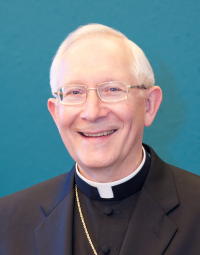
Archbishop Leonard P. Blair
Articles for the Catholic Transcript must be submitted far in advance, and as I write this for the May edition, Ukraine is in the throes of agony as a result of the Russian invasion. Where that brutalized nation is as you read this, I cannot foretell. But May is traditionally dedicated to Mary, the Mother of Jesus, and the message she spoke in 1917 at Fatima in Portugal is not unrelated to the wars and sufferings of our world and of human souls today. Her appearances there have been recognized by the Church as being authentic. “Our Lady of Fatima” is commemorated in the Church calendar on May 13.
In a book entitled Vision of Fatima Father Thomas McGlynn, OP, writes that “Fatima is, first of all, a dreadful warning to the world to stop sinning. The enormity of mankind’s rebellion against God and God’s infinite aversion to sin form the foundation of the Fatima message. … Our Lady [spoke] of temporal punishments that would be visited on the world if people did not amend their lives. … But we definitely miss ‘the spiritual meaning of things’ if we think our Lady came to Fatima to tell us how to keep out of a third world war, or how to convert Russia, or how to achieve tranquility in our earthly existence. She came to tell us how to keep out of hell! The temporal punishments are secondary; they are punishments that strangely impress us more than hell. Yet all the bleeding, dying and despair of a thousand wars cannot equal the disaster of a single soul being damned.” At Fatima, Mary gave this warning: “Do not offend our Lord anymore. He is already much offended. … Pray, pray very much; and make sacrifice for sinners. Many souls are lost, because there are none to make sacrifices for them.”
If it could be said in 1917 that our Lord was “much offended,” what must his judgment be of the world today in 2022? As our hearts go out to the victims of war in Ukraine and elsewhere, we are obliged by our Catholic faith “to prayer and to action so that the divine Goodness may free us from the ancient bondage of war” and all the “evils and injustices” it brings with it. (cf. CCC 2307, 2327)
Yet, as Father McGlynn points out, “All the bleeding, dying and despair of a thousand wars cannot equal the disaster of a single soul being damned.” Remember what Jesus himself told us: “Do not fear those who kill the body but cannot kill the soul; rather fear him who can destroy both soul and body in hell.” (Mt 10:28)
We live in a culture that no longer speaks of sin or believes that there is a hell. Instead, it creates earth-bound ideologies in which each individual is free to define, dare I say even create, himself or herself or even some other kind of “self ” freed, as Marxism preaches, from all authority and all dependence on anything, including God. This ideology exacts its own penalties for non-conformity. It creates its own earthly hell for those who oppose it, and many are they who, for lack of fidelity to their Catholic Faith and the reception of Penance and the Eucharist, fall prey to it.
“Do not offend our Lord anymore,” Mary said over a century ago, “He is already much offended. … Pray, pray very much; and make sacrifice for sinners. Many souls are lost, because there are none to make sacrifices for them.” Jesus made the supreme sacrifice on the cross and he tells us to take up our cross and follow him. To sacrifice means “to give until it hurts,” that is to say, until it costs us something. There are the sacrifices we must make to be true to our Catholic Faith, and the sacrifices – spiritual and material – that we can offer up for the salvation of souls. As I write this, the people of Ukraine are making great sacrifices for their homeland and for one another. What sacrifices are we willing to make for the spiritual and material well-being of all humanity and the world itself?
